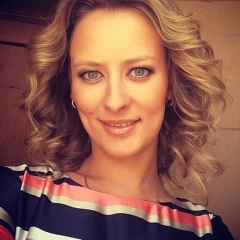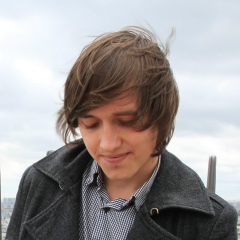Записки о #FAB11. День третий.
Сегодня был последний день стандартной программы и весьма неожиданно меня пригласили выступить с рассказом о нашем фаблабе перед большой аудиторией - если провести аналогию с научной конференцией, то такое выступление это как доклад на пленарной лекции в сравнении с докладом на какой-то сессии (что было вчера).
Рассказал спокойно, возможно даже излишне - не хватает в другом языке эпитетов и эмоций для выражения на публике.
После утренних докладов от фаблабов была сессия, посвященная созданию жизни (Making Life). Докладчиков было меньше, чем в предыдущие дни (http://www.fab11.org/schedule/fab-11-conversations-making-life/), но на качестве это не отразилось.
Я вчера говорил, что больше всего с фаблабовских конференций мне из пленарных докладов понравилось выступление про создание объектов из ДНК. Его автор - Peng Yin из Molecular Systems Lab (Harvard Medical School) выступал и в этот раз с рассказом о том, как его рабочая группа продвинулась вперед. На мой взгляд, это очень впечатляюще - я постарался записать его доклад (всего около 6 минут) и его прикладываю далее.
Другие доклады не особо поразили/вдохновили. Нил после докладов как и в предыдущие дни увел дискуссию в русло "не пугают ли вас ваши разработки?" и т.п. морально-этические вопросы.
Эти три дня говорят о том, что организаторы знакомы с большим числом интересных и крутых людей, но невозможно каждому из них дать хотя бы 15 минут на нормальный рассказ о своем деле. Всё время было впечатление, что человек только начинает рассказывать, как сразу заканчивает..
После обеда я продолжил участие в сессии по созданию машин - сегодня из картона с помощью ПВА и небольшого количества других материалов мы за 2.5 часа создали рисующий плоттер. При этом Nadya Peek на лету модифицировала стандартные программы fabmodules и показывала как работать с gestalt расширением к python, позволяющему управлять станками.
Главное отличие этого подхода - легкость и конфигурируемость. Не нужно, к примеру, придумывать новые g-коды для своего станка, если он должен не только ездить по трем осям, но и выдавливать что-то или поворачивать что-то, к примеру. Т.е. любой актуатор и сенсор - один нод станка, и эти ноды можно легко добавлять/удалять и конфигурировать.
Прототипирование станков с картоном описано тут - http://monograph.io/james.
Всем увлекающимся созданием станков - рекомендую "на побаловаться". Всерьез эти разработки пока использовать не получится, т.к. нет профилей ускорения и замедления - все перемещения работают на постоянной скорости, что не подходит для промышленного использования.
Из жизненного - вчера был сильный ливень и град, в следствии чего прерывая программу из большого шатра оперативно выгнали всех людей, поэтому большая часть фаблабов презентовалась сегодня.
Сегодня мы взяли велосипеды в прокат на три дня - это удобно, если не считать только отсутствие велосипедов в стоянке у MIT вечером - видимо не одни мы такие умные.
Прогулялся в одном из корпусов MIT - у них здорово. Радуют места для свободной работы, чего катастрофически не хватает в Политехе, и часто встречающиеся необычные устройства и объекты. Так сегодня я столкнулся с созданным на фрезерном станке работающим макетом старого процессора, который может считать (есть вентили, такты в виде бильярдных шаров, есть операции с числами и др.). А еще я очень удивился вечером увидев двух зайцев. Потом, увидев еще около десятка, перестал удивляться, но всё-таки - откуда они там и как выживают в городских условиях?
И последнее на сегодня - вечером зашли в бар-ресторан Independant - морепродукты и американская кухня с напитками порадовали и насытили вечер...
Завтра начинается симпозиум, а за ним на выходных - фестиваль.
P.S. Видео не грузится - выложу его позже
Пора спать, т.к. завтра программа начинается в центре Бостона, а значит встать надо раньше.
Всем доброго утра и хорошего дня!
Сегодня был последний день стандартной программы и весьма неожиданно меня пригласили выступить с рассказом о нашем фаблабе перед большой аудиторией - если провести аналогию с научной конференцией, то такое выступление это как доклад на пленарной лекции в сравнении с докладом на какой-то сессии (что было вчера).
Рассказал спокойно, возможно даже излишне - не хватает в другом языке эпитетов и эмоций для выражения на публике.
После утренних докладов от фаблабов была сессия, посвященная созданию жизни (Making Life). Докладчиков было меньше, чем в предыдущие дни (http://www.fab11.org/schedule/fab-11-conversations-making-life/), но на качестве это не отразилось.
Я вчера говорил, что больше всего с фаблабовских конференций мне из пленарных докладов понравилось выступление про создание объектов из ДНК. Его автор - Peng Yin из Molecular Systems Lab (Harvard Medical School) выступал и в этот раз с рассказом о том, как его рабочая группа продвинулась вперед. На мой взгляд, это очень впечатляюще - я постарался записать его доклад (всего около 6 минут) и его прикладываю далее.
Другие доклады не особо поразили/вдохновили. Нил после докладов как и в предыдущие дни увел дискуссию в русло "не пугают ли вас ваши разработки?" и т.п. морально-этические вопросы.
Эти три дня говорят о том, что организаторы знакомы с большим числом интересных и крутых людей, но невозможно каждому из них дать хотя бы 15 минут на нормальный рассказ о своем деле. Всё время было впечатление, что человек только начинает рассказывать, как сразу заканчивает..
После обеда я продолжил участие в сессии по созданию машин - сегодня из картона с помощью ПВА и небольшого количества других материалов мы за 2.5 часа создали рисующий плоттер. При этом Nadya Peek на лету модифицировала стандартные программы fabmodules и показывала как работать с gestalt расширением к python, позволяющему управлять станками.
Главное отличие этого подхода - легкость и конфигурируемость. Не нужно, к примеру, придумывать новые g-коды для своего станка, если он должен не только ездить по трем осям, но и выдавливать что-то или поворачивать что-то, к примеру. Т.е. любой актуатор и сенсор - один нод станка, и эти ноды можно легко добавлять/удалять и конфигурировать.
Прототипирование станков с картоном описано тут - http://monograph.io/james.
Всем увлекающимся созданием станков - рекомендую "на побаловаться". Всерьез эти разработки пока использовать не получится, т.к. нет профилей ускорения и замедления - все перемещения работают на постоянной скорости, что не подходит для промышленного использования.
Из жизненного - вчера был сильный ливень и град, в следствии чего прерывая программу из большого шатра оперативно выгнали всех людей, поэтому большая часть фаблабов презентовалась сегодня.
Сегодня мы взяли велосипеды в прокат на три дня - это удобно, если не считать только отсутствие велосипедов в стоянке у MIT вечером - видимо не одни мы такие умные.
Прогулялся в одном из корпусов MIT - у них здорово. Радуют места для свободной работы, чего катастрофически не хватает в Политехе, и часто встречающиеся необычные устройства и объекты. Так сегодня я столкнулся с созданным на фрезерном станке работающим макетом старого процессора, который может считать (есть вентили, такты в виде бильярдных шаров, есть операции с числами и др.). А еще я очень удивился вечером увидев двух зайцев. Потом, увидев еще около десятка, перестал удивляться, но всё-таки - откуда они там и как выживают в городских условиях?
И последнее на сегодня - вечером зашли в бар-ресторан Independant - морепродукты и американская кухня с напитками порадовали и насытили вечер...
Завтра начинается симпозиум, а за ним на выходных - фестиваль.
P.S. Видео не грузится - выложу его позже
Пора спать, т.к. завтра программа начинается в центре Бостона, а значит встать надо раньше.
Всем доброго утра и хорошего дня!
Notes on # FAB11. Third day.
Today was the last day of the standard program and quite unexpectedly I was invited to speak with a story about our fab book before a large audience - if we draw an analogy with a scientific conference, then such a performance is like a report at a plenary lecture compared to a report at some session (which was yesterday ).
He told calmly, perhaps even unnecessarily - there are not enough epithets and emotions in another language for expression in public.
After the morning reports from the fab labs, there was a session dedicated to the creation of life (Making Life). There were fewer speakers than in previous days (http://www.fab11.org/schedule/fab-11-conversations-making-life/), but this did not affect the quality.
I said yesterday that most of the Fablab conferences from the plenary reports I liked the presentation about the creation of objects from DNA. Its author, Peng Yin from Molecular Systems Lab (Harvard Medical School), spoke this time about how his working group moved forward. In my opinion, this is very impressive - I tried to write down his report (about 6 minutes in total) and attach it further.
Other reports are not particularly impressed / inspired. Neil after the reports, as in previous days, led the discussion into the mainstream "Do your developments not scare you?" etc. moral and ethical issues.
These three days indicate that the organizers are familiar with a large number of interesting and cool people, but it is impossible for each of them to give at least 15 minutes to a normal story about their business. All the time there was an impression that a person is just starting to tell how he immediately finishes ..
After lunch, I continued to participate in the session on the creation of machines - today, in 2.5 hours, we made a drawing plotter out of cardboard using PVA and a small amount of other materials. At the same time, Nadya Peek modified standard fabmodules programs on the fly and showed how to work with the gestalt extension to python, which allows you to control machine tools.
The main difference of this approach is ease and configurability. You do not need, for example, to invent new g-codes for your machine, if it should not only drive along three axes, but also squeeze something or turn something, for example. Those. any actuator and sensor is one machine node, and these nodes can be easily added / removed and configured.
Prototyping machine with cardboard described here - http://monograph.io/james.
Everyone interested in the creation of machines - I recommend "to indulge." Seriously, these developments still can not be used, because No profiles of acceleration and deceleration - all movements operate at a constant speed, which is not suitable for industrial use.
Of life, yesterday there was heavy rain and hail, and as a result, interrupting the program from the large tent quickly drove out all the people, so most of the fab labs were presented today.
Today we rent bicycles for three days - this is convenient, except for the lack of bicycles in the MIT parking lot in the evening - apparently not alone we are so smart.
Walked in one of the buildings MIT - they have great. Pleasing places for free work, which is catastrophically lacking in the Polytech, and often encountered unusual devices and objects. So today I ran into a working model of an old processor created on a milling machine that can count (there are gates, bars in the form of billiard balls, there are operations with numbers, etc.). And I was very surprised in the evening when I saw two birds with one stone. Then, seeing about a dozen, I stopped being surprised, but still - where are they from and how do they survive in urban conditions?
And the last one today - in the evening, we went to the Independant bar-restaurant - seafood and American cuisine with drinks pleased and filled the evening ...
Tomorrow the symposium begins, followed by the festival at the weekend.
P.S. The video does not load - post it later
It's time to sleep, tk. Tomorrow the program begins in the center of Boston, which means that it is necessary to get up earlier.
Good morning everyone and have a nice day!
Today was the last day of the standard program and quite unexpectedly I was invited to speak with a story about our fab book before a large audience - if we draw an analogy with a scientific conference, then such a performance is like a report at a plenary lecture compared to a report at some session (which was yesterday ).
He told calmly, perhaps even unnecessarily - there are not enough epithets and emotions in another language for expression in public.
After the morning reports from the fab labs, there was a session dedicated to the creation of life (Making Life). There were fewer speakers than in previous days (http://www.fab11.org/schedule/fab-11-conversations-making-life/), but this did not affect the quality.
I said yesterday that most of the Fablab conferences from the plenary reports I liked the presentation about the creation of objects from DNA. Its author, Peng Yin from Molecular Systems Lab (Harvard Medical School), spoke this time about how his working group moved forward. In my opinion, this is very impressive - I tried to write down his report (about 6 minutes in total) and attach it further.
Other reports are not particularly impressed / inspired. Neil after the reports, as in previous days, led the discussion into the mainstream "Do your developments not scare you?" etc. moral and ethical issues.
These three days indicate that the organizers are familiar with a large number of interesting and cool people, but it is impossible for each of them to give at least 15 minutes to a normal story about their business. All the time there was an impression that a person is just starting to tell how he immediately finishes ..
After lunch, I continued to participate in the session on the creation of machines - today, in 2.5 hours, we made a drawing plotter out of cardboard using PVA and a small amount of other materials. At the same time, Nadya Peek modified standard fabmodules programs on the fly and showed how to work with the gestalt extension to python, which allows you to control machine tools.
The main difference of this approach is ease and configurability. You do not need, for example, to invent new g-codes for your machine, if it should not only drive along three axes, but also squeeze something or turn something, for example. Those. any actuator and sensor is one machine node, and these nodes can be easily added / removed and configured.
Prototyping machine with cardboard described here - http://monograph.io/james.
Everyone interested in the creation of machines - I recommend "to indulge." Seriously, these developments still can not be used, because No profiles of acceleration and deceleration - all movements operate at a constant speed, which is not suitable for industrial use.
Of life, yesterday there was heavy rain and hail, and as a result, interrupting the program from the large tent quickly drove out all the people, so most of the fab labs were presented today.
Today we rent bicycles for three days - this is convenient, except for the lack of bicycles in the MIT parking lot in the evening - apparently not alone we are so smart.
Walked in one of the buildings MIT - they have great. Pleasing places for free work, which is catastrophically lacking in the Polytech, and often encountered unusual devices and objects. So today I ran into a working model of an old processor created on a milling machine that can count (there are gates, bars in the form of billiard balls, there are operations with numbers, etc.). And I was very surprised in the evening when I saw two birds with one stone. Then, seeing about a dozen, I stopped being surprised, but still - where are they from and how do they survive in urban conditions?
And the last one today - in the evening, we went to the Independant bar-restaurant - seafood and American cuisine with drinks pleased and filled the evening ...
Tomorrow the symposium begins, followed by the festival at the weekend.
P.S. The video does not load - post it later
It's time to sleep, tk. Tomorrow the program begins in the center of Boston, which means that it is necessary to get up earlier.
Good morning everyone and have a nice day!








У записи 11 лайков,
3 репостов.
3 репостов.
Эту запись оставил(а) на своей стене Игорь Асонов
































